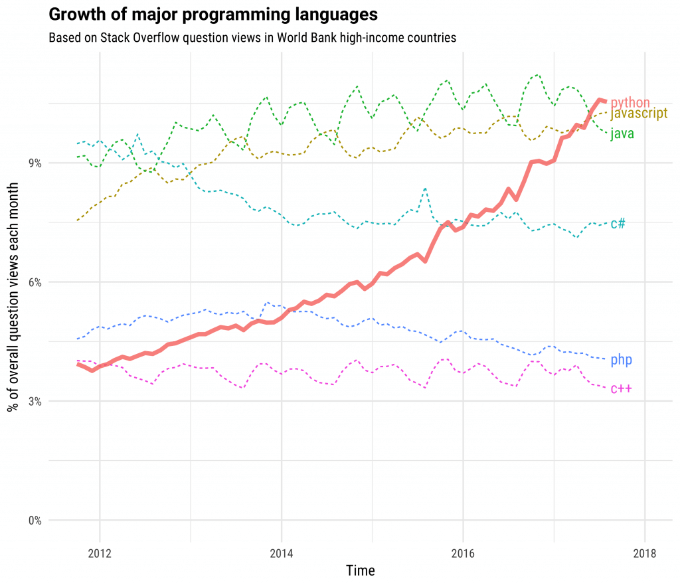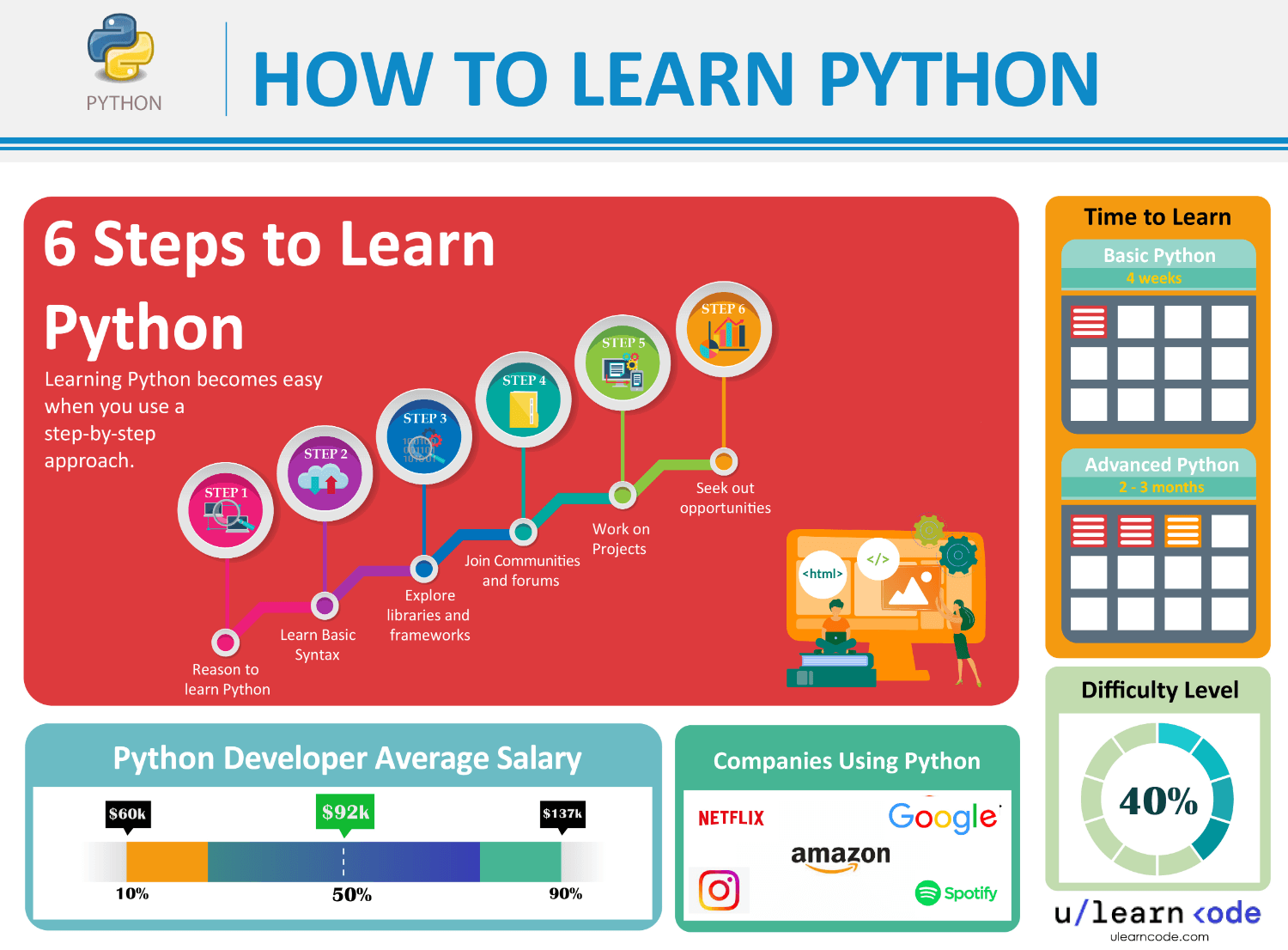Contents
Python is certainly one of the modern programming languages that carries a lot of potential for all age groups. It does not matter if you are 6 or 60 years old, you can learn Python according to your capabilities. It is the only language that is considered kid-friendly with tons of Python-for-Kids programs available.
Despite the simplicity of this language, its applications are immensely widespread with Python being used in most of the latest technologies such as:
- Artificial Intelligence
- Machine Learning
- Deep Learning
Moreover, it has a range of applications in program-, mobile-, and game development. The exponential growth of the language from the year 2012 to 2018 can be seen in the graph below. Python is projected to grow even more in the upcoming years.

With the language growing at a fast pace, the best thing about it is that almost everyone can learn it due to its simple syntax and programming nature.
Is Python hard to learn?
According to Thinkful, over 22% of Python developers had little or no prior experience with programming. In a broader perspective, people from different backgrounds can easily learn the language due to its relatively simple syntax and absence of difficult statements as well as symbols.
As previously mentioned, Python is a kid-friendly language, and any kid above age 6 can start and go from printing “Hello World” to creating a game with Pygame toolkit. If a kid can learn the basics then it is nothing difficult for a young adult.
If you are young and just starting out programming, consider taking Python as your very first language instead of beginning with Java or C++ which may exhaust you with their difficult-to-understand concepts.
How long does it take to learn Python?
The time period required to learn this language varies among people from different backgrounds. While experienced programmers may take only 2 weeks to learn the basic concepts, on average, a person with some basic computer and programming knowledge can learn Python concepts in less than 8 weeks.
The basis that is learnable in 8 weeks include:
- language syntax
- loops
- links
- IF statements
- variables
- data types
- functions
Python is a really diversified language with countless applications, therefore, you have to target and master it for specific domains after learning the initial concepts.
Most people learn Python as a hobby as it facilitates them to automate their small boring tasks and create bots for different purposes. Whereas, if your aim is to master the language to get a job, then you must choose a specific domain and find good frameworks to work on.
Basic Python can help solve little problems, but on an advanced level, you can use your language skills to innovate in different domains such as, Artificial Intelligence and mobile development. It can take years for one to master the language on a professional level to hunt high-paying jobs.
6 Steps to Learn Python

There are different roadmaps to learn Python, but the following is the most simplified 6-step way to learn it with ease.
Step 1: Reason to Learn Python
Learning the language is not just about understanding the basic language concepts: you need to have a clear understanding of what it is capable of.
With Python almost everywhere in our technological world, there are hundreds of domains to choose from. You have to find your interests that motivate you to learn the language.
Here are a few of the popular Python applications in which you can gain expertise to provide professional coding services:
- Data science / Machine Learning
- Mobile apps
- Websites
- Games
- Data processing and analysis
- Hardware / Sensors / Robots
- Scripts to automate your work
Once you have selected your domain then you can choose from a range of frameworks that can be used to pursue your career with the language. Python frameworks allow you to develop software or applications for a specific platform.
As you now have your motive, let’s move to our next step which is crucial for every beginner.
Step 2: Learn Basic Syntax
The syntax is probably the most basic and important thing that you need to master. Python has a very easy learning curve due to its simple syntax, which is more like basic mathematics, thereby making the language easy to grasp.
These excellent Python courses will take you through all these basic concepts to engrave them to memory. Moreover, tutorials on the basics of the language are available on YouTube in multiple languages. Some amazing YouTube sources are mentioned here:
- freeCodeCamp.org – Full Beginner’s Course
- Programming with Mosh – Python for Beginners
- Telusko – Python Programming Tutorial for Beginners
If you have learned the basic programming concepts, then start making small programs and bots to test out your skills. Think out of the box and create programs to solve real-life problems and do not hesitate to make mistakes as it will eventually help you grow.
Before you start learning the language, make sure you install the latest Python 3 instead of its previous version. Python 3 is much improved while Python 2 has some loopholes and bugs.
Step 3: Explore Libraries and Frameworks
You cannot stick to basic Python knowledge for long. Once you have a strong grip on the language concepts then it’s time to explore suitable libraries and frameworks according to your area of interest.
If you are interested in Machine Learning then TensorFlow is a great option to explore. Pygame is another open-source Python library which facilitates game development. Explore and learn about multiple libraries and frameworks to choose the best one according to your needs.
Step 4: Join Communities & Forums
There is an abundance of ideas on Python forums and communities where you can take lessons directly from the experts. The best thing about these communities is that most are free to join. Moreover, you can write down any queries or problems to get them solved by senior members.
Therefore, contributing to such forums will undoubtedly help improve your skills. Here are a few of the important forums that you should join to learn Python:
If you are stuck somewhere and need some strong references to find a solution, then Python documentation is perhaps the best guide available.
Step 5: Work on Projects
There are thousands of program ideas available on the internet. GitHub is a great source to check Python projects for inspiration. Online forums are also full of ideas to work on.
Test your skills on open-source projects first so that you can gain a certain level of expertise in your domain. Thereafter, you should come up with a unique idea to develop something with your own imagination and skills.
You can also contribute to non-profit organizations as a volunteer developer. Start looking for such opportunities nearby to strengthen your language skills.
It is mandatory to fix all errors and problems that occur in your code. However, do not exhaust yourself with such errors and use an analytical approach to find the roots of persistent problems.
It is also necessary to keep your programming skills updated by following Python news via professional programmers, blogs, and YouTube channels.
Step 6: Seek out Opportunities
Once you have successfully developed a number of Python applications with your own imaginative thinking, then it is time to resolve problems for your client. You can easily sell your services on freelancing platforms to improve your skills.
Make sure you develop your portfolio to document and present your previous projects to your clients. After a successful freelance career, you can find good job opportunities for Python experts. Make a professional resume with all your previous experiences to land a successful interview, and finally, a job.
But don’t stop there. Once you get the job, keep improving your skills and keep finding better opportunities for yourself. Crucially, ensure you carry the most updated knowledge of the language, as outdated expertise will be of no use.
To Sum Up
Python is the only language that is so easy to learn for almost all age groups. Its exponential growth in the previous decade has shown us the true potential of this language. The applications and possibilities are limitless and there is a lot of room for new developers.
The programming world is ever-changing, hence it is recommended to keep yourself updated with the latest trends and news.
Many new frameworks are launched for Python that can facilitate you in different domains making it extremely vast. You should focus on any of its single areas to develop your expertise.